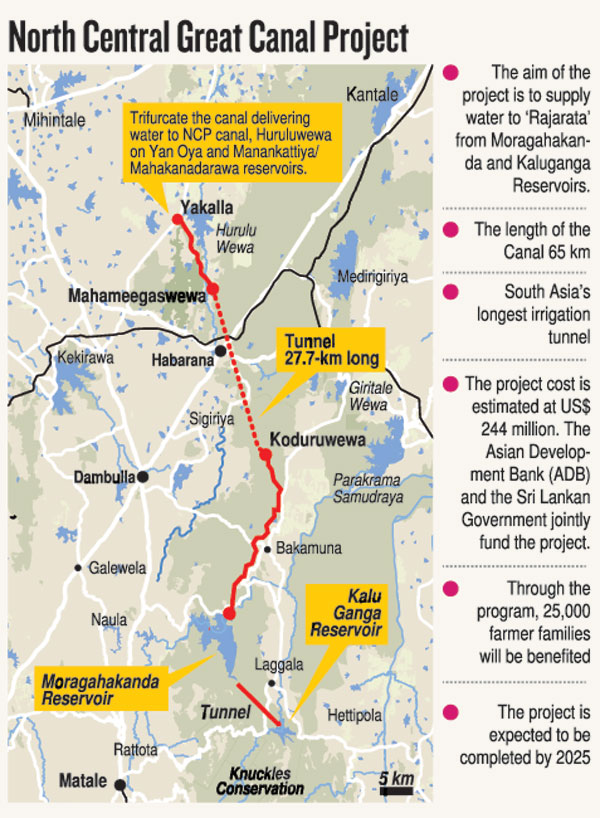News
Pull the plug on this costly Elahera deal, engineers urge
Irrigation engineers have urged the government to review the Upper Elahera Canal Project (UECP), launched by President Gotabaya Rajapaksa on February 5, saying the massive project is faulty and a waste of taxpayers’ money.
They claim the Rs 85 billion project is being implemented without a detailed study underpinning it.
It is claimed the detailed Water Balance Study required for such a project has not been carried out properly. As a result, engineers could not give an economically viable explanation as to how the huge flow of water envisaged by the project would be guaranteed.
The project, funded by the government and a loan from the Asian Development Bank (ADB), is the final project of the Mahaweli Development Project, begun in 1968 but subjected to continual delays due to financial difficulties and the 30-year civil war.
The Upper Elahera Canal Project has two phases. In the first phase, excess water from the Moragahakanda and Kalu Ganga reservoirs are to be taken via several diversions to the North-Central and North-Western provinces to fulfil drinking water and agricultural needs. Initially, a 65km canal from Moragahakanda to Yakalla, Anuradhapura, was planned for this purpose but the Environmental Impact Assessment on the proposed canal was rejected by the Central Environmental Authority.
Subsequently, it was planned to construct, within the 65m stretch, a costly tunnel 28km long and eight meters in diameter. To build this canal would cost an estimated Rs. 48 billion – a third of the total project cost of Rs. 85 billion.
Strong doubts have been raised about whether this massive financial commitment, based on the premise of protecting the environment, is economically viable.
The construction of the Upper Elahera Canal Project was awarded to the China State Construction Engineering Corporation by Cabinet’s Standard Technical Procurement Committee.
The Sunday Times has learned this tender was awarded before a detailed study had been carried out.
A senior engineer told The Sunday Times, “They have no idea of how to find the massive volume of water to be carried through a tunnel with such a huge dimension. Certain engineers of the Irrigation Department have misled the government on the UECP.”
While the first phase of the UECP was scheduled to be constructed within six years, at the foundation-laying on February 5, President Rajapaksa emphasised that completion time be accelerated to four years. The new deadline has caused the Irrigation Department to be inundated with proposals for a costly tunnel boring machine and several access tunnels.
The Sunday Times has been made aware of serious concerns about the UECP raised more than a year ago by External Resources Department Director-General Priyantha Ratnayake to the Secretary of the Ministry of Mahaweli Development and Environment in a letter dated 26 August 2019.
“There are huge cost differences between base cost estimates,” Director-General Ratnayake
said in the letter.
“It was revealed that most of these cost increases are basically due to over-designing and high-cost specifications as informed by the representatives of the Department of Irrigation.”
Further, the letter noted, “Instead of obtaining guidance to Consultants to deliver a financially and technically feasible product to the country, in some instances, the Project Management Unit has just agreed on solutions proposed by the Consultants without any further review by local experts.”
In the second phase of the Upper Elahera Canal Project, water will be taken from Yakalla to several reservoirs in the Northern Province, including Iranamadu.
This part of the project does not seek to provide water for new cultivation areas in the North-Central, North-Western or Northern Provinces. Instead, drinking water needs will be fulfilled and 137 cascade systems will be created to nourish 74,000 hectares of existing cultivation in these three provinces, increasing productivity.

There are two more costly proposals:
it is proposed to pump 300 million cubic metres (mcm) of water for 20km from the Janaranjana anicut at the lower end of the Mahaweli River to send 650 mcm of water to the North;
it is also proposed that 400 mcm of water from the Randenigala reservoir through a 40km canal at a cost of Rs. 60 billion.
A senior engineer of the Ceylon Electricity Board, speaking on the basis of anonymity, had this to say: “While there is a power shortage in the country, how can you pump water 20km? Is that wise economics?”
Responding to the various allegations against the Upper Elahera Canal Project, Programme Director Engineer D. B. Wijeratne said a Water Balance Study had been carried out relying on annual rainfall data over 30-40 years from the Mahaweli Authority.
He also justified the necessity for an eight-metre-wide tunnel, saying gradient was required for taking water from Moragahakanda.
He also said that currently, farmers were irrigating their fields at a level equivalent to water at a height of four to five feet per acre of paddy, and they should be educated not to waste water. It was expected that in the future they would move to using the equivalent of 3.5 feet of water per acre, and for this the UECP would deliver adequate water.
He also said although it had been planned to pump water from the Janaranjana anicut, nothing has been finalised.
The former chairman of the Water Forum of the Institute of Engineers of Sri Lanka, Dr. Kamal Laksiri, said he had many doubts on the viability of the Upper Elahera Canal Project on the information he has received, which includes allegation about irregularities in the implementation of the project. He said the institute was planning to conduct a detailed discussion with all stakeholders.
Against this backdrop, External Resources Department Director-General Ratnayake has recommended in his letter, “Stop phase two studies until completion of a detailed Water Balance Study”.


